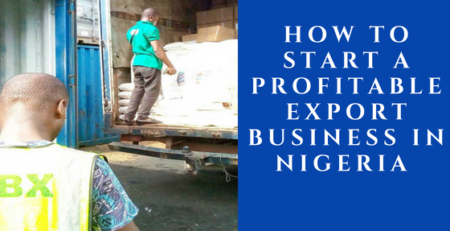Export in Nigeria: How To Start Export Business
Export in Nigeria: An Untapped Goldmine
Export can be defined as the act of producing goods or services in one country and then selling or trading them abroad. Export in Nigeria can be done by the company that manufactures the products or provides the service, through either indirect or direct channels.
Export is the shipment of goods from within the Nigeria territory to a place outside Nigeria. You can freely export anything that is not subjected to an export prohibition or restriction.
If you are considering export in Nigeria then I recommend you take this training offered by a reputable company that is into export in Nigeria.
How to join the upcoming Export Business Combo Training
According to a recent record about 45 million African Americans live in the United States of America. Which is about 14 per cent of the population of the biggest economy in the world and with African American purchasing power of about one trillion dollars.
This then present market opportunities for African products such as African foodstuff (fufu, cassava, crayfish, yam, garri, palm oil, melon seeds, bush mango seeds, okra, cocoyam powder, pepper, spices), African hair accessories, clothing, craft, arts etc.
.
If you add up the size of Africans in Canada, Europe to the number of those in the USA, then you see a potential export business waiting to be tapped. So, starting export in Nigeria is an untapped gold mine with future promises.
Caribbean regions also present a veritable market for African products too with a reasonable population size of Africans over there. Therefore, increase chances for export in Nigeria.
This write up will introduce you to everything you need to know about export in Nigeria, classifications of exporters, benefits of export in Nigeria, export business options and possible challenges during export in Nigeria
Table of Contents
Who is an Exporter?
Export in Nigeria involves taken out for sale to other countries anything that is manufactured or sourced in Nigeria. An exporter is a person who makes profits by selling Nigerian made goods or services in a foreign market.
The federal government through several incentive programmes today encourages export of Nigerian made goods and services.
Export business is the future business as well said by Nigeria Export Promotion Council. As a potential income generating business, corporate entities as well as, individuals have abundant opportunities to participate, sanitize and ensure that the country’s image is not compromised through shady deals in export
Classifications of Exporters
Exporters can be classified into the following categories:
Export Manufactures: These are manufacturing companies who also export their products to foreign markets
Export Trader: This is an exporter who buys goods and trade in a foreign market. This is the category that most of us fall into. It involves selling Nigerian goods that present foreign markets.
Service Exporters: This is a business entity or an individual that provides services for agencies doing export in Nigeria. These may include:
- Ocean shipping line
- Banks
- Consultancy
- Airlines
- Road carriers
- Freight forwarding
- Couriers
- Custom brokers
- Logistics handling
- Insurance companies
- Trade show organizers
- Training
Different Kinds of Export in Nigeria
Full-Time Exporter: This involves those that are 24 hours available such as those that just resigned or lost their jobs, retiree and business organizations that like to be fully involved in their export operations. They only engage freight forwarders minimally for port loading operations.
Becoming a full-time exporter offers between 30% to 45% of return on investment depending on the negotiating power and sourcing abilities of the exporter.
The exporter will be involved in the following duties:
- Export Planning
- Export Financing
- Export Contract Sourcing
- Export Product Sourcing
- Pre-Export Documentation
- Haulage To The Warehouse
- Warehousing and Inspection
- Freight Forwarding
- Haulage To The Port of Loading
- Post-Export-Documentations
Part-Time Exporter: These are for individuals that would like to start a business while still in a paid employment and also have some time to spare. It’s also a viable option for existing businesses that want to divest. It could yield 25% to 35% return on investment.
They depend on freight forwarders and consulting firms to carry out some of their export duties and operations. The export is involved in:
- Export Planning
- Export Financing
- Export Product Sourcing
- Pre-Export Documentation
- Haulage to The Warehouse
- Haulage to the Port of Loading
- Post-Export-Documentations.
Consort Exporter: This is an individual who is into export in Nigeria while still in paid employment but does not have enough time to spare.
The return on investment for this one could range from 10% to 25%. He or she depends on local sourcing and buying agents, consulting firms and freight forwarders to carry out most of the operations.
The exporter is only involved in:
- Export Planning
- Export Financing
- Pre-Export Documentation
- Post-Export Documentations.
Export Broker: Becoming an export broker is one of the easiest and most rewarding ways any prospecting exporter can raise money to go into full-time export business.
They provide exporters or importers with assistance in transporting their product from point A to point B. This includes assisting exporters with advice and formal paperwork that must be completed to ensure smooth export of cargo. Over the years, their role has been extended to the entire supply chain. Not only do they act as an exporter’s “shipping department”, their roles also encompass shipping, product sourcing, inventory management, customs clearance, warehousing and distribution.
Selling to foreign markets can change your business. Like any fundamental change to the way you trade, there are risks as well as benefits you should consider. You should weigh them up before starting to move into overseas markets.
Advantages of Export in Nigeria
The reason for individuals or companies to consider exporting is quite compelling; the following are few of the major advantages of exporting:
- Maximize profits by exploiting opportunities in foreign markets that don’t exist in the domestic market.
- Increased Sales and Profits.
- Enhance Domestic Competitiveness
- Gain Global Market Shares
- Diversification
- Lower Per Unit Costs
- Compensate for Seasonal Demands
- Create Potential for Personal or Company Expansion.
- Sell Excess Production Capacity
- Gain New Knowledge and Experience
- Expand Life Cycle of Product
Export Challenges
The following are some of the challenges you may come across when venturing into the international marketplace.
- Getting Genuine Buyers
- Extra Costs.
- Product Modification
- Financial Risk
- Export Licenses and Documentation
- Market Information
Conclusion
Starting an export in Nigeria requires:
- Careful Planning
- Some Capital
- Market Know-How
- Access to Quality Product
- Competitive Pricing Strategy
- Management Commitment
Hope this write up helps you in considering export in Nigeria. If you are serious on starting export in Nigeria, I recommend you attend this export training programme where you will practically learn about how to start export business in Nigeria, food processing and packaging for local and foreign market and digital marketing skills for exporters.










Leave a Reply
You must be logged in to post a comment.